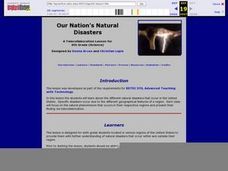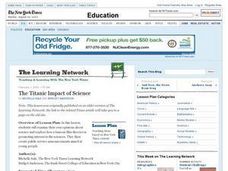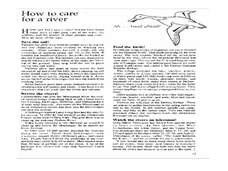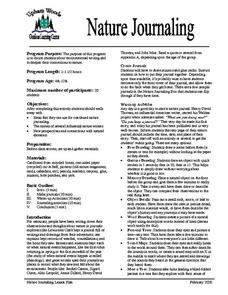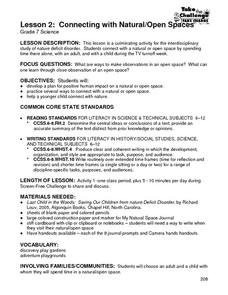Berkshire Museum
Nature Journaling: Experience the Outdoors Through Writing and Drawing
Step into the great outdoors and develop young scientists' skills of observation with a nature journaling lesson. Given a specific focus or goal, children practice making and recording observations of nature through written descriptions...
Curated OER
Our Nation's Natural Disasters
Sixth graders classify their regions' natural disaster(s). Within this lesson students enhance their research skills by utilizing different resources, as well as their writing skills by composing short research papers.
Curated OER
Space and Science Fiction
Use the Franklin Institute's exhibition "An Inquirer's Guide to the Universe" to have students research ideas for a science fiction story. After completing their research, writers will compose science fiction stories that incorporate...
Curated OER
The Titanic Impact of Science
Discuss personal ideas about science and how a filmmaker can employ the arts to promote science. After reading an article, young scientists will discover how James Cameron is trying to interest people in the oceans. In groups, they will...
Curated OER
The Delicate Balance - Iowa's Natural Resources
Discover the natural resources in Iowa by studying it's history. In this environmental instructional activity, your students will observe a topographical map of Iowa and identify where its most valuable resources are. They complete an...
Curated OER
Integrating Science and Literature
Maximize time and engage learners by using children's literature in your science lessons.
Core Knowledge Foundation
Cycles in Nature Tell It Again!™ Read-Aloud Anthology
A read-aloud anthology offers stories all about nature's life cycles. Over three weeks, second graders listen to and discuss tales about the cycles of daytime, nighttime, seasons, plants, trees, frogs, butterflies, and water. Following...
Curated OER
Natural Disasters: Stormy Weather in Art, Writing, and Music
Using personal experience, visual art, and music that evoke natural disasters, your older high schoolers create their own expressions of storms. Learners conduct online research about weather drama. They make their own expressive...
Curated OER
Nature Journaling
Writers participate in a unique form of environmental writing and deepen their connections to nature through journaling. They generate new ideas and thoughts that they can use for continued nature journaling and explore a variety of...
EngageNY
End of Unit Assessment Part II: Science Talk
Scholars complete Part 2 of their end of unit assessment by having a science talk. Pupils pair up to answer questions about what makes a natural disaster. As one learner talks, the other records what is said. They then trade places.
Purdue University
Benefits of Connecting with Nature
Feel the healing effects of nature. Individuals learn about the benefits of nature using imagery. They begin by defining words to express how they feel emotionally and then practice using those words with hands-on activities. Once they...
Curated OER
Selecting the Tap: Water Safety
Examine water as a scarce natural resource instead of taking it for granted. Middle schoolers identify the traits of potable water, and research local water sources to determine if they are impaired or not.
K12 Reader
Natural Resources
What natural resources are available in your area? Your learners can consider this question after reading a brief passage about natural and renewable resources. After reading, class members respond to five questions related to the reading.
Global Oneness Project
Learning with Nature
Think outside the box - and think about education beyond the classroom walls - with a resource that has your critical thinkers watching a video about a nursery in Scotland that lets youngsters roam wild in a forest....
Curated OER
Does Mother Nature Know Best?
Investigate herbal medicine in the science or health classroom with this lesson from the New York Times. After a discussion about class members beliefs about and experiences with herbal medicines, pupils read an article that might...
EngageNY
Building Background Knowledge and Making Inferences: What Is a Natural Disaster?
That's a disaster! Scholars complete a gallery walk to view images and make inferences about natural disasters. They fill out a note catcher about what they observe and infer any questions they may have. They then participate in a World...
Curated OER
Living With Risk: The Human Element of Natural Disasters
Students explore human elements that are a part of natural disasters, read a Hawaiian myth, conduct a survey, discuss why people choose to live in high risk areas, and participate in a writing activity based on studenT real life accounts...
Curated OER
Our Disastrous World
Students explore natural disasters around the world from the experiences of other students, friends and families. They collaborate with countries such as Japan, China, India, Australia, Russia, Great Britain as well as from the United...
Curated OER
Mother Nature Has Her Say
Students use their creative writing skills to develop interview questions for Mother Nature. Using writing, they respond to the questions another student developed and use the internet to research any topic they need more information on....
Curated OER
Natural Disasters: Earthquakes and Tsunamis
In this natural disasters worksheet, students complete 5 different activities regarding natural disasters.
Take the challenge
Connecting with Natural/Open Spaces
Get your class outside, away from the television, and maybe even learning something about nature while they're at it. Individuals will chose an open, natural space to spend time in for several days. Each day they will complete a page in...
Curated OER
A Research Project and Article For the Natural Inquirer
Get your class to use the scientific process to solve a scientific problem. They utilize the Natural Inquirer magazine to identify a research question which they write an introduction to and collect data to answer. They use graphs,...
Curated OER
Science: Schoolyard Trees
Sixth graders choose specific trees to research while taking a nature walk around the schoolyard. They discuss tree and leaf parts and observe various types of leaves. After writing their reports, 6th graders present them to the class...
Houghton Mifflin Harcourt
Nature: Friend and Foe: Challenge Activities (Theme 6)
The teacher doesn't always have to be the expert in the classroom. The first in a series of three supplementary activities Nature: Friend or Foe uses hands-on research tasks and projects to enhance readers' understanding of non-fiction...
Other popular searches
- History and Nature of Science
- The Nature of Science
- Nature of Science Biology
- Nature of Science Inquiry
- Nature of Science Physics
- History Nature of Science
- Science Patterns in Nature
- Genetics Nature of Science
- Teaching Nature of Science
- Nature of Science Weather
- Genetic Nature of Science
- Science and Nature

